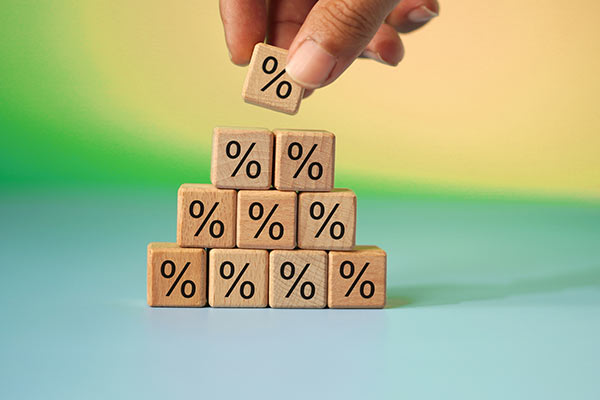Will interest rates really peak in September?
After 14 hikes in 20 months, there are signs that the interest-rate cycle might soon grind to a halt. Craig Rickman looks at what’s going on and examines what this might mean for you.
30th August 2023 12:14
by Craig Rickman from interactive investor

Thursday 4 November 2021. That was the last time the Bank of England’s Monetary Policy Committee (MPC) decided to keep interest rates on hold. Since then, the MPC has met 14 times and jacked the base rate up on every occasion.
Policymakers meet again on 21 September, and it seems inevitable that rates will go up again. However, this might be the final hike of the cycle.
- Invest with ii: Open a Stocks & Shares ISA | ISA Investment Ideas | Transfer a Stocks & Shares ISA
According to a recent poll by Reuters, economists believe the Bank of England will increase the base rate just one more time to 5.50%.
If this prediction turns out to be accurate, interest rates will peak a lot sooner than many had previously expected. Until recently, many economists felt that rates would continue going up until early 2024.
UK interest rates hit a 15-year high in August, rising 0.25 percentage points to 5.25%. The UK central bank is desperately trying to bring inflation down, which has stubbornly refused to budge, and at 6.8% remains almost 3.5 times higher than its 2% target.
But now there are concerns that while further rate increases might bring inflation down faster, there could be knock-on implications for the UK economy.
Why has the outlook for interest rates changed?
Until recently, the consensus has been that interest rates will keep rising until early next year, peaking at around the 6% mark. In June, some economists even believed that rates of 6.5% were possible.
But recent economic data has shifted the mood.
- Inflation eases, but recession looms: what to do as you approach retirement
- Interest rates rise to 5.25%: what does this mean for me?
It’s become clear that central banks on both sides of the Atlantic recognise the need to tread carefully with further rate rises. The aggressive approach used over the past 20 months might have to be tempered.
The situation with inflation has improved in recent months, but the speed and size of interest rate hikes is impacting both households and businesses, which are grappling with higher borrowing costs. Further rate rises will increase this strain, and fear is this may tip the UK into recession next year.
Early data from the S&P Global/CIPS Purchasing Managers’ Index (PMI) found that business activity in the UK manufacturing sector contracted during August, with an economic downturn now on the cards for the third quarter.
In the US, inflation currently sits at 3.3%, far lower than in the UK. But despite this, Jerome Powell, chair of the US Federal Reserve, still believes that it’s too high. Speaking on Friday 25 August at the annual gathering of world central bankers at Jackson Hole, Powell emphasised the tricky balancing act confronting central banks right now.
“Doing too little could allow above-target inflation to become entrenched and ultimately require monetary policy to wring more persistent inflation from the economy at a high cost to employment," he said.
But Powell added that “doing too much could also do unnecessary harm to the economy.”
The Bank of England faces a similar problem. While inflation dropped sharply in both June and July, the UK central bank does not expect to hit its 2% inflation target until early 2025 – some 18 months away.
What this means is that, whether or not interest rates peak in September, it might be some time before we start to see them come down. Analysts at Capital Economics reckon we will have to wait until 2026 for the base rate to drop to 3%.
August’s inflation data, which will be published in mid-September, will influence the MPC’s decision next month.

How are interest rates affecting mortgage rates and house prices?
Whenever interest rates go up, borrowing becomes more expensive. As a result, mortgage deals have rocketed since the Bank of England began hiking the base rate.
Mortgage rates have been nudging down recently, which is good news for borrowers. But these falls have been only marginal. The average two-year fixed rate is currently around 6.75%, far higher than at any point since 2008.
This is choking buyer affordability. According to trade association UK Finance, first-time buyer and home-mover purchases both dropped by almost a third during April and June this year.
- Should you cash in investments to pay off our your mortgage
- Cash rates are rising but lag inflation: here's where to invest instead
Even those who can afford to buy might be holding off in the hope that property prices keep falling over the coming months and they can secure a bargain.
The housing market has certainly cooled this year after rising around 20% during Covid as the race for space and beefed-up consumer savings sparked a red-hot market.
This month, UK property valuations fell 1.9%, according to Rightmove, the steepest August drop since 2018. This continued four months of property market falls.
While experts are divided on what the future might hold, most agree the housing market will be subdued for some time. Whereas some believe that a crash could be on its way, others feel the current gradual decline will continue to play out. Either way, it might be some time before prices start to rise again.
What can we expect when interest rates peak?
Whether you’re a saver, a borrower, or both, it’s reached the point where most people will be happy to see the back of interest rate rises.
Few disagreed that interest rates needed to climb above the rock-bottom levels we had seen since the financial crisis in 2008. Cheap borrowing has its advantages for us as individuals, most notably when it comes to paying off a mortgage, but can have implications for the wider economy. Low interest rates typically increase the demand for property, with the average house price now 8.8 times the average earnings.
The return of higher savings rates has certainly provided a boost to any money you hold in cash. You can now earn more than 5% in easy-access accounts, or as much as 6% if you’re prepared to tie the money up for a year.
This means that your savings are eroding at a much slower pace than previously. But some experts believe that savings rates have now peaked, and might even start to fall, no matter what happens to interest rates.
- Will overpaying my mortgage or pension make me richer
- Benstead on bonds: why interest rate cuts aren't coming soon
If interest rates do peak next month, mortgage rates should stabilise. But the situation, particularly for first-time buyers, remains tough. In an interesting recent development, it is now cheaper to rent a home than to buy one, according to Zoopla. This is despite rents increasing at their fastest pace for seven years.
The 1.5 million households on variable rate mortgages may have found things especially hard this year. These mortgages are great when rates come down, as your monthly payments will reduce immediately, but can be painful when rates rise.
The news that the rate hike cycle might be drawing to a close should bring some relief here. Many families took out variable-rate mortgages last year in the hope that the base rate would start to fall during 2023. Instead, rates have continued to rise.
If you are one of the 1.4 million borrowers on a fixed-rate deal that’s set to expire this year, then it’s really important to shop around. Even if rates do peak in September, you will struggle to find deals with terms equally favourable to what you have right now.
If you feel the new rates are unaffordable, then it’s worth speaking with your lender to find out what you can do. Some options include temporarily switching to an interest-only mortgage or taking a mortgage holiday. Alternatively, you could consider using lump sums to clear some or all the outstanding balance. Rachel Lacey wrote an excellent article for anyone thinking about cashing in investments to pay off their mortgage.
These articles are provided for information purposes only. Occasionally, an opinion about whether to buy or sell a specific investment may be provided by third parties. The content is not intended to be a personal recommendation to buy or sell any financial instrument or product, or to adopt any investment strategy as it is not provided based on an assessment of your investing knowledge and experience, your financial situation or your investment objectives. The value of your investments, and the income derived from them, may go down as well as up. You may not get back all the money that you invest. The investments referred to in this article may not be suitable for all investors, and if in doubt, an investor should seek advice from a qualified investment adviser.
Full performance can be found on the company or index summary page on the interactive investor website. Simply click on the company's or index name highlighted in the article.